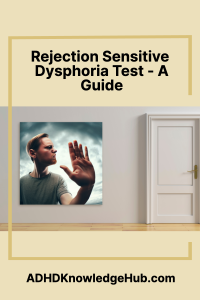Rejection Sensitive Dysphoria Test – A Guide
Introduction – Rejection Sensitive Dysphoria Test
Ever felt like a mere whisper of criticism or rejection sends your emotions into a tailspin? You’re not alone. As someone deeply passionate about ADHD solutions, I’ve delved deep into a symptom often overshadowed by other manifestations: Rejection Sensitive Dysphoria (RSD) and Testing for it. Understanding this can be the key to unlocking a fuller, more joyful life.
What is Rejection Sensitive Dysphoria (RSD)?
RSD is not just an average emotional reaction. It’s an intense, often overwhelming response to perceived or actual rejection or criticism. This emotion is particularly common in individuals with ADHD. But what really lies behind this mysterious term?
Symptoms of RSD
- A sense of devastation from even gentle constructive feedback.
- Emotional meltdowns that seem to erupt from nowhere.
- Avoidance behavior, where one might steer clear of social scenarios fearing potential rejection.
If these symptoms sound familiar, there’s a chance you’ve encountered RSD in your life or in someone close to you.
Causes of RSD
RSD is a complex phenomenon. While the precise cause remains a mystery, many theories suggest it stems from a combination of neurobiological factors and past traumatic experiences. ADHD brains are known to be wired differently, leading to a heightened emotional response.
Importance of Rejection Sensitive Dysphoria Test
Think of this test as a torchlight in a dim room. If you believe you’re struggling with RSD, getting tested can shine a light on what’s happening internally.
It’s important to understand that diagnosing conditions like RSD requires a comprehensive evaluation by a trained mental health professional. They use a combination of clinical interviews, observation, patient history, and sometimes standardized questionnaires to come to a diagnosis.
If you or someone you know believes they might have RSD or any other psychological condition, it’s essential to seek evaluation from a licensed psychologist, psychiatrist, or another appropriate healthcare provider.
At the ADHD Knowledge Hub I can provide general information about RSD, ADHD, or related topics, the definitive assessment and diagnosis should be conducted by professionals in a clinical setting. As do I, they will have the training and expertise necessary to interpret results, make a diagnosis, and provide recommendations for treatment or management, but they must see you first to do this.
Why get tested?
Why should anyone dive deep into their psyche? Clarity. The first step to addressing any challenge is recognizing it. Understanding, if you have rejection sensitive dysphoria, equips you with the insight needed to tackle it and test for it.
Understanding your results
A diagnosis can be daunting. But remember, it’s just a tag, a label. What you do with this information is what truly matters.
Solutions and Aids for RSD
Hope is not just a four-letter word. There are tangible, actionable steps one can take to manage and even overcome the challenges of rejection sensitive dysphoria and testing for it.
Cognitive Behavioral Therapy (CBT)
Imagine retraining your brain to respond differently to triggers. That’s CBT in a nutshell. By helping reframe negative thought patterns and behaviors, CBT stands out as a beacon of hope for many with RSD.

Medications
Yes, there’s a pill for that. But, it’s essential to remember that medications should be tailored to individual needs. A range of drugs can help manage RSD symptoms, but always consult a healthcare professional before diving in.
Pricing insights
Cost is a significant factor for many. Medications for RSD can vary, ranging from $30 to $200 monthly. CBT sessions, on the other hand, can range between $100-$250 per hour, based on the therapist’s experience and location.
Tips for Coping with RSD
Beyond therapy and medication, there are everyday techniques that can help manage rejection sensitive dysphoria and testing for it.
Mindfulness Techniques
Mindfulness is the art of being present. By grounding oneself in the present moment, we can distance ourselves from overpowering emotional responses. Meditation, deep-breathing exercises, or even daily journaling can offer relief. There are several apps and courses available, often priced under $10/month.
Connecting with Support Groups
Humans are social creatures. Sharing our experiences and struggles can be profoundly therapeutic. Whether in-person or online, support groups offer a sanctuary for those grappling with rejection sensitive dysphoria and testing for it. Many groups are free or have minimal membership fees.
Conclusion
Embarking on the journey of understanding and managing rejection sensitive dysphoria and testing for it is no small feat. Armed with knowledge, the right tools, and an indomitable spirit, it’s a battle you can win. Remember, each person’s journey is distinct and uniquely their own. And always know that seeking help and support signifies strength, not weakness.
FAQs
- How prevalent is RSD among ADHD individuals?
- Estimates vary, but a significant proportion of those with ADHD report experiencing RSD symptoms.
- Are the medications for RSD safe?
- All medications come with potential risks and benefits. It’s paramount to consult with a healthcare professional to ensure they’re right for you.
- How often should one practice mindfulness techniques?
- Daily practice, even if just for a few minutes, can make a profound difference.
- How to find a reliable support group?
- Start online. Websites like Meetup or even dedicated ADHD forums often have listings for local and virtual groups.
- Does age impact the severity of RSD?
- While RSD can affect individuals of all ages, some people find their symptoms lessen or become more manageable with age and coping strategies.

*We may earn a commission for purchases made using our links. Please see our disclosure to learn more.




